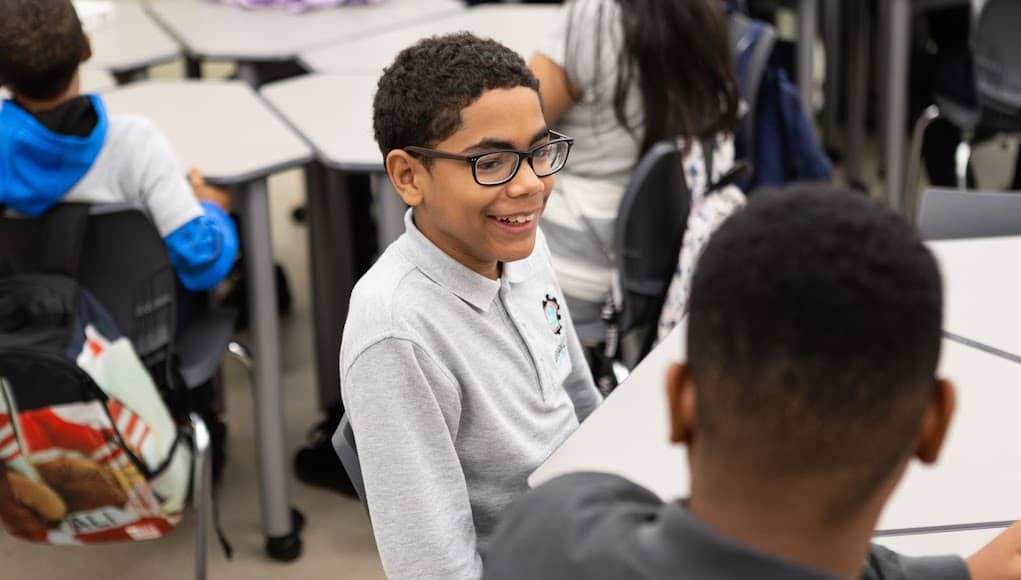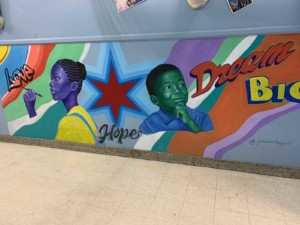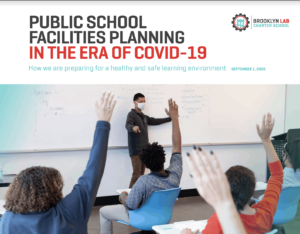Advancing Equity Through Innovation: 7 Noteworthy Approaches From Brooklyn LAB

Launched with 132 sixth-graders in 2014, Brooklyn Laboratory Charter Schools (@BklynLabSchool) operates two middle school campuses and a second-year high school in downtown Brooklyn.
As a college-preparatory school, Brooklyn LAB is built on the premise that we need to prepare all students to one-day hold jobs that likely don’t exist yet. However, by mastering skills such as problem-solving and conflict resolution, students will be ready to tackle those new challenges, regardless of their career path.
LAB embraces seven innovative approaches to educate scholars and advance equity.
1. Big goals. Designed with support from XQ, Carnegie and Next Generation Learning Challenges, LAB’s innovative high school aims at NGLC MyWays and XQ Learner Goals, including cultivating original thinkers, generous collaborators, and learners for life. These broader and deeper measures of learning reflect genuine preparation for adult life and the future of work.
2. Small groups. Central to the LAB instructional model is high-dose small group instruction. During LAB’s extended day, it provides at least two hours of tutoring, mainly in math, reading, writing, and supporting habits that foster academic success.
Shelley Pinks, the Dean of the LAB Corps Fellowship, says LAB’s approach to small-group instruction supports and motivates students with a range of learning needs and levels of mastery. “We remediate and accelerate learning to ensure that students who are behind reach grade level, and students who are ahead receive additional challenges,” Pinks says.
3. Personalized professional learning. LAB’s innovative staffing model provides personalized instruction using a combination of technology and four roles: lead teachers, learning specialists, teacher residents, and fellows. This approach positions students to form relationships with multiple adults in core academic subjects, and the different staff pathways LAB created allows them to recruit and develop educators of color.
LAB does this through the LAB Corps, a one-year fellowship for which the school recruits with college graduates from across the country. Fellows support high-dose tutoring by working with LAB scholars in small-group or one-on-one tutorials, providing personalized academic support. LAB invites select LAB Corps Fellows to participate in the LAB Teacher Residency program, giving them the opportunity to earn a master’s in education while apprenticing under one of LAB’s Master Teachers.
This unique pathway to teaching has helped LAB cultivate talented educators while meeting the goals to diversify public education. “LAB focuses on developing and advancing adults within the LAB community—all in the service of breakthrough student results,” says Gayla Thompson, LAB’s Director of Talent Development. “We make significant investments in our people because the development of talent is core to our values. We believe that internal talent pipelines are our best source of future leaders.”
 4. A center of excellence. LAB is dedicated to educating students with complex needs, and more than one-third of LAB scholars experience challenges learning. Because of this commitment, LAB is one of only four schools nationally to be named a “Center of Excellence” by the National Center for Special Education in Charter Schools. To earn this designation, schools must enroll more than double the percentage of students with complex learning and attention needs as students enrolled by the sending district.
4. A center of excellence. LAB is dedicated to educating students with complex needs, and more than one-third of LAB scholars experience challenges learning. Because of this commitment, LAB is one of only four schools nationally to be named a “Center of Excellence” by the National Center for Special Education in Charter Schools. To earn this designation, schools must enroll more than double the percentage of students with complex learning and attention needs as students enrolled by the sending district.
“LAB demonstrates an explicit commitment to exemplary programs, with a focus on quality and inclusion—and LAB achieves higher-than-average outcomes for students with disabilities,” said School Director Greg Rodriguez.
A combination of classroom instruction, digital playlists in the Cortex learning platform, and small-group instruction reflect individual student interests and needs. As a Center of Excellence, LAB shares best practices about how to provide exemplary services to students with disabilities.
5. Growth first. LAB believes that measuring student academic growth can help students, educators, and families work together to cultivate learning for all students. School Director Leyde St Leger has created a program with a goal to help every scholar attain at least two years of growth every year. Many LAB scholars have achieved three or more years of growth in one year. LAB uses the Northwest Evaluation Association (NWEA) Measures of Academic Progress (MAP) and the College Board SAT Suite of Assessments to track accountability for growth. LAB tracks progress toward key milestones, and LAB educators constantly modify their approach to meet the needs of individual scholars.
“We encourage, recognize, and celebrate the achievements of students, and we are committed to providing meaningful feedback,” said Director of Academics, Bennison Ntsakey.
6. Community engagement. LAB understands the critical role of families and communities in education, and communicates regularly—in person, digitally, on paper, and via phone—on academic and behavioral strengths and progress. LAB provides opportunities for families to engage, including regular family nights, conferences, and a parent leadership council. The school also conducts family-input sessions to solicit feedback on school practices and policies.
“The key to strong parent engagement is relationships built through trust and ongoing communication,” says Jonathan Flynn, Manager of Family and Community Affairs.
LAB has also built relationships with local business and institutions of higher learning. LAB scholars intern with organizations including Amplify, Made in NY Media Center and MAGNET Center, and colleges including NYU, Pratt, Carnegie Mellon, and City Tech. Through partnerships with colleges, eleventh and twelfth-graders can enroll in credit-bearing courses to ease their academic and financial transition into college.

7. College Board rigor for all. LAB believes in supporting all students to succeed with higher expectations and insists that the best way for students to prepare for college is to take challenging courses and work hard in class. To this end, LAB aligns course requirements with college admissions, making rigorous courses widely accessible and challenging students to take college-level courses.
As a “Pre-Advanced Placement” pilot school, LAB enrolls 100% of ninth-graders in College Board-designed courses in literature, science, history, and mathematics. LAB uses the SAT Suite of Assessments to guide curricular and assessment practices.
LAB Co-Founder Eric Tucker asks: “How can the 6-12 curriculum get all students ready for AP and other college-level coursework? What other high-leverage mechanisms might significantly increase the number of students who are able to access and complete college-level work? How can we personalize skill building—including recuperation and acceleration—aligned to the critical set of knowledge, skills, and understanding that predicts college success?”
Add Brooklyn LAB to your list of middle and high schools worth visiting to see innovative practices that accelerate learning.
For more, see:
- Personalizing Math and Success Skills in Brooklyn
- America’s Edu Power Couple On Balancing Innovation and Execution
- 100+ Middle and High Schools Worth Visiting
Stay in-the-know with innovations in learning by signing up for the weekly Smart Update. This post includes mentions of a Getting Smart partner. For a full list of partners, affiliate organizations and all other disclosures, please see our Partner page.







0 Comments
Leave a Comment
Your email address will not be published. All fields are required.